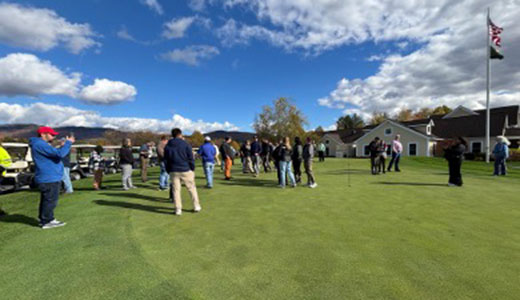

GCSAA publishes specialized information on a frequent basis that drills down on top advocacy issues and activities.
On Oct. 8, Mark Finch, CGCS, The Country Club of Vermont, hosted a group of state, tribal, and territorial pesticide inspectors at his course to teach them about golf’s handling of pesticides and use of best management practices (BMPs). The presentation and tour were part of a larger program for pesticide inspection and investigation training. Representatives from state departments of agriculture and environment across the country gathered in Vermont to attend a week-long conference put together by the National Association of State Department of Agriculture (NASDA).
Also in attendance were Chava McKeel, GCSAA director of government affairs; Kevin Doyle, GSCAA’s Northeast regional field staff representative; Jesse Sutton, CGCS, Fox Run Golf Club; and other members of Finch's golf course management team. 
For his portion of the Pesticide Inspector Residential Training (PIRT) program, Finch facilitated a two-hour presentation and golf course tour including a tour of the maintenance facility. The goal of the event was to familiarize regulators with the environmental stewardship superintendents practice at golf courses. He introduced the representatives to golf course operations as they have to do with pesticides, soil health, irrigation and BMPs, and alongside industry partners, answered follow-up questions.
Finch then led them on a tour of the facility where he provided commentary and demonstrations of pesticide application equipment. Finally, he took the group onto the course for a first-hand look at data collection tools and for a tour of the landscape.
The cooperation between The Country Club of Vermont and NASDA represents a key component of professional advocacy. Without the agencies’ promotion of events like these and superintendents’ eagerness to engage in conversation with regulators, no understanding is fostered between golf and the officials charged with monitoring the environment. Golf’s inclusion in regulatory training and education programs helps prevent misconceptions from developing on both sides. When industry and government work together, common goals are reaffirmed and worked toward more effectively.